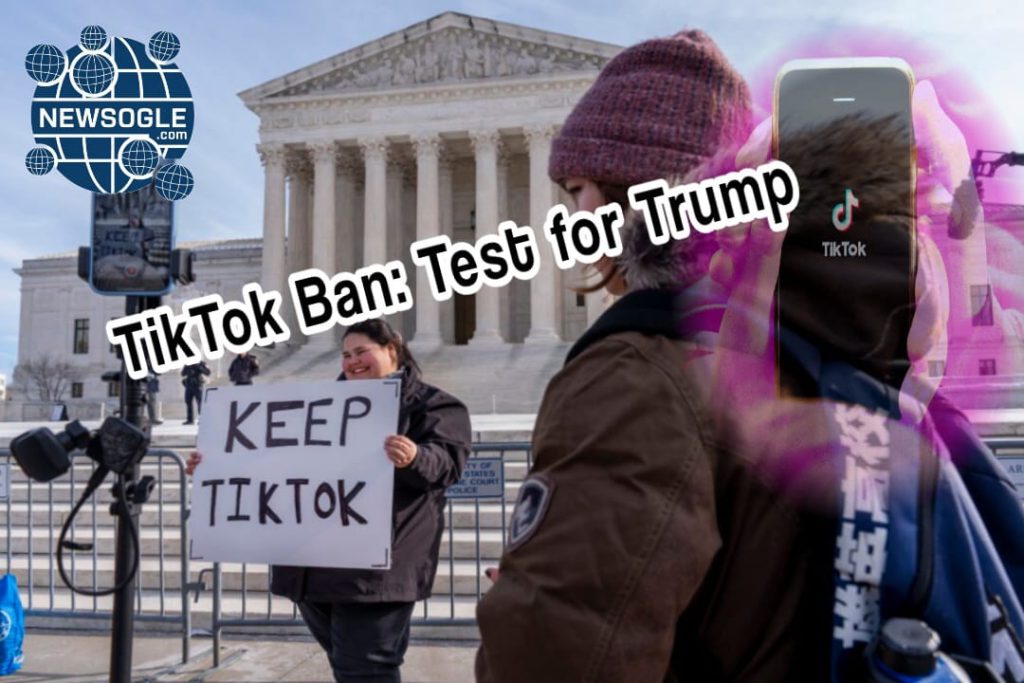
tiktok
Date: January 18, 2025
By: Saqqaf Yasir Khan
The recent ruling by the U.S. Supreme Court to uphold the social media application sale-or-ban law has set the stage for a significant challenge for President-Elect Donald Trump as he prepares to take office. With the deadline for the parent company, ByteDance, to divest its interest in the app quickly approaching, Trump’s ability as a dealmaker will be put to the test. This article delves into the implications of this ruling, the political landscape surrounding it, and what it means for Trump’s administration as he navigates this complex issue.
Table of Contents
Background of the TikTok Controversy
The app has been under scrutiny since its rise in popularity among American users. Owned by Chinese company ByteDance, it has faced allegations regarding data privacy and national security concerns. Lawmakers from both sides of the aisle have raised alarms about the potential for user data to be accessed by the Chinese government, given that ByteDance operates under Chinese laws that could compel it to share information with authorities.
The Protecting Americans from Foreign Adversary Controlled Applications Act
In April 2024, Congress passed the Protecting Americans from Foreign Adversary Controlled Applications Act, which requires ByteDance to divest its U.S. operations by January 19, 2025, or face a nationwide ban. The Supreme Court’s decision on January 17 upheld this law after the application’s appeal was rejected. This ruling underscores the government’s commitment to addressing national security risks associated with foreign-owned applications.
Key Points of the Ruling
- Divestiture Deadline: ByteDance must sell its U.S. TikTok operations by January 19 or face a ban.
- National Security Concerns: The court emphasized that national security risks outweigh concerns about limiting free speech for TikTok’s 170 million U.S. users.
- Political Implications: The ruling places significant pressure on Trump as he steps into office.
Trump’s Position and Political Landscape
As Trump prepares to assume the presidency, he faces a unique challenge with the social media platform. His previous administration attempted to ban the application in 2020 but faced legal obstacles that thwarted those efforts. Now, with a clear mandate from Congress and a Supreme Court ruling backing it up, Trump must navigate this situation delicately.
Trump’s Approach as Dealmaker
Trump has always positioned himself as a dealmaker, emphasizing negotiation and compromise. His approach will be crucial in determining TikTok’s future in the U.S.:
- Negotiation Opportunities: Trump has indicated that he seeks a political resolution rather than an outright ban. This could involve negotiating terms that allow TikTok to remain operational while addressing security concerns.
- Potential Buyers: If divestiture is necessary, identifying suitable buyers who can meet government requirements will be crucial.
Public Sentiment and User Reactions
Public opinion regarding TikTok is mixed. While many users appreciate the platform’s unique features and community engagement, there are growing concerns about data privacy:
- User Backlash: Many TikTok users have expressed shock and disappointment at the prospect of losing access to the app.
- Influencers’ Concerns: Influencers and content creators who rely on TikTok for their livelihood are particularly anxious about the potential ban.
Implications for National Security
The Supreme Court’s decision reflects broader national security concerns regarding foreign-owned applications:
- Data Privacy Risks: The court highlighted that TikTok’s extensive data collection practices pose risks that could be exploited for surveillance or influence campaigns.
- Legislative Support: Bipartisan support for measures targeting foreign applications indicates a unified approach toward protecting U.S. interests.
International Relations and Diplomatic Considerations
The situation surrounding TikTok also has implications for U.S.-China relations:
- Bilateral Tensions: The scrutiny of Chinese companies operating in the U.S. is part of a larger trend of increasing tensions between Washington and Beijing.
- Future Negotiations: How Trump handles negotiations with ByteDance could set a precedent for future dealings with Chinese firms.
A Defining Moment for Trump’s Presidency
As President-Elect Trump prepares to take office, the impending TikTok ban represents one of his first significant tests as a leader and dealmaker. The decisions made in this context will not only impact millions of American users but also shape perceptions of his administration’s approach to national security and international relations.
Key Takeaways
- Urgency of Action: With only days until the deadline, Trump’s administration must act swiftly to address this issue.
- Potential for Negotiation: There remains an opportunity for negotiation that could allow TikTok to continue operating under new ownership or conditions.
- Implications Beyond TikTok: The outcome will likely influence future policies regarding foreign-owned technology companies operating in the United States.
As we move closer to January 19, all eyes will be on President-Elect Trump and his administration’s handling of this critical issue. Will he rise to the occasion as a skilled dealmaker, or will he face challenges that could define his presidency from day one? Only time will tell.
This article provides an in-depth analysis of the implications surrounding the ban and how it serves as a litmus test for Donald Trump’s capabilities as a dealmaker in chief. It discusses various aspects including legal rulings, public sentiment, national security concerns, and international relations within a comprehensive framework suitable for readers interested in politics and technology.
The Economic Consequences of the TikTok Ban for the U.S.
As the deadline for TikTok’s potential ban approaches, the implications of such a decision are becoming increasingly clear. The U.S. government’s move to restrict access to the popular social media platform could have far-reaching economic consequences. This article explores the potential impacts of a TikTok ban on various sectors, including small businesses, content creators, advertising revenue, and broader economic indicators.
The Rise of TikTok
TikTok has emerged as one of the most influential social media platforms in recent years, boasting over 150 million users in the United States alone. Its unique algorithm and engaging content have made it a favorite among younger audiences and a powerful tool for businesses seeking to reach consumers. The platform has not only transformed how users interact with social media but has also created significant economic opportunities for creators and small businesses.
Economic Contributions of TikTok
According to a recent study by Oxford Economics, TikTok contributed approximately $24.2 billion to the U.S. GDP in 2023 and supported around 224,000 jobs. The platform has become an essential marketing tool for small and medium-sized enterprises (SMBs), generating nearly $15 billion in revenue for these businesses through its advertising capabilities.
Potential Economic Consequences of a Ban
1. Loss of Revenue for Small Businesses
The most immediate impact of a TikTok ban would be felt by small businesses that rely heavily on the platform for marketing and customer engagement. Many SMBs use TikTok to reach younger consumers who increasingly turn to social media for product recommendations and local business discovery.
- Marketing Channel Disruption: A ban would sever a vital marketing channel for these businesses, hampering their ability to reach potential customers effectively.
- Revenue Decline: Small businesses that generated substantial income through TikTok could face significant revenue declines, leading to layoffs or even closures.
2. Impact on Content Creators
Content creators have leveraged TikTok to build their brands and monetize their content through sponsorships and partnerships. A ban would jeopardize their livelihoods:
- Loss of Income: Many creators depend on TikTok as their primary source of income. Influencers like Sarah Perl, who has built a successful business around her TikTok presence, estimate losing upwards of six figures monthly if the ban is enforced.
- Community Disruption: TikTok has fostered vibrant communities around various interests. A ban would disrupt these communities, forcing creators to seek alternative platforms that may not offer the same engagement or monetization opportunities.
3. Advertising Revenue Decline
The advertising landscape would also feel the repercussions of a TikTok ban:
- Shift in Ad Spending: Brands that have invested heavily in advertising on TikTok would need to redirect their budgets to other platforms like Instagram or YouTube. However, experts argue that no other platform offers the same level of engagement and return on investment as TikTok.
- Loss of Brand Partnerships: Many brands rely on influencers to promote their products on TikTok. A ban would eliminate this avenue for brand partnerships, leading to decreased sales and market visibility.
4. Broader Economic Implications
The ramifications of banning TikTok extend beyond individual creators and businesses:
- Job Losses: With TikTok supporting approximately 224,000 jobs directly or indirectly, a ban could lead to widespread job losses in sectors reliant on digital marketing and content creation.
- GDP Impact: The loss of $24.2 billion in GDP contributions from TikTok could hinder economic growth at a time when many Americans are already struggling with inflation and economic uncertainty.
5. Cultural Costs
Beyond economic implications, a TikTok ban would also have cultural consequences:
- Loss of Creative Expression: TikTok serves as a platform for diverse voices and creative expression. A ban risks stifling this creativity and limiting cultural exchange.
- Educational Opportunities: Many users utilize TikTok for educational content, learning new skills or gaining insights into various subjects. The loss of this resource could hinder informal education avenues.
Conclusion: Navigating Uncertainty
As the potential ban on the app looms closer, stakeholders across various sectors must grapple with uncertainty regarding their futures. Small businesses, content creators, advertisers, and consumers all stand to lose significantly if access to the platform is restricted.
The situation presents an opportunity for policymakers to consider alternative solutions that address national security concerns without sacrificing economic growth and innovation. As discussions continue regarding the future of the app in the U.S., it is essential to weigh both the economic benefits it provides against any perceived risks associated with its ownership.
This article provides an in-depth analysis of the potential economic consequences of a TikTok ban in the U.S., highlighting its impact on small businesses, content creators, advertising revenue, and broader economic indicators while considering cultural implications as well.





